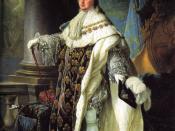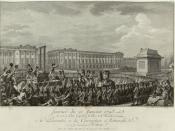The last thirty years have given us a new version of the history of the French Revolution, the most diverse and hostile schools having contributed to it. The philosopher, Taine, drew attention to the affinity between the revolutionary and what he calls the classic spirit, that is, the spirit of abstraction which gave rise to Cartesianism and produced certain masterpieces of French literature. Moreover he admirably demonstrated the mechanism of the local revolutionary committees and showed how a daring Jacobin minority was able to enforce its will as that of "the people". Following up this line of research M. Augustin Cochin has quite recently studied the mechanism of the sociétés de pensée in which the revolutionary doctrine was developed and in which were formed men quite prepared to put this doctrine into execution.
The influence of freemasonry in the French Revolution proclaimed by Louis Blanc and by freemasonry itself is proved by the researches of M.
Cochin. Sorel has brought out the connection between the diplomacy of the Revolution and that of the old regime. His works prove that the Revolution did not mark a break in the continuity of the foreign policy of France. The radically inclined historical school, founded and led by M. Aulard, has published numerous useful documents as well as the review, "La Révolution Française". Two years since, a schism occured in this school, M. Mathiez undertaking opposition to M. Aulard the defence of Robespierre, in consequence of which he founded a new review "Les Annales Révolutionaires". The "Société d'histoire contemporaine", founded under Catholic auspices, has published a series of texts bearing on revolutionary history. Lastly the works of Abbé Sicard have revealed in the clergy who remained faithful to Rome various tendencies, some legitimist, others more favourable to the new political forms, a new side...



Very Good
Although it needed references. I don't know why people are so scared to cite references on this site.
0 out of 0 people found this comment useful.